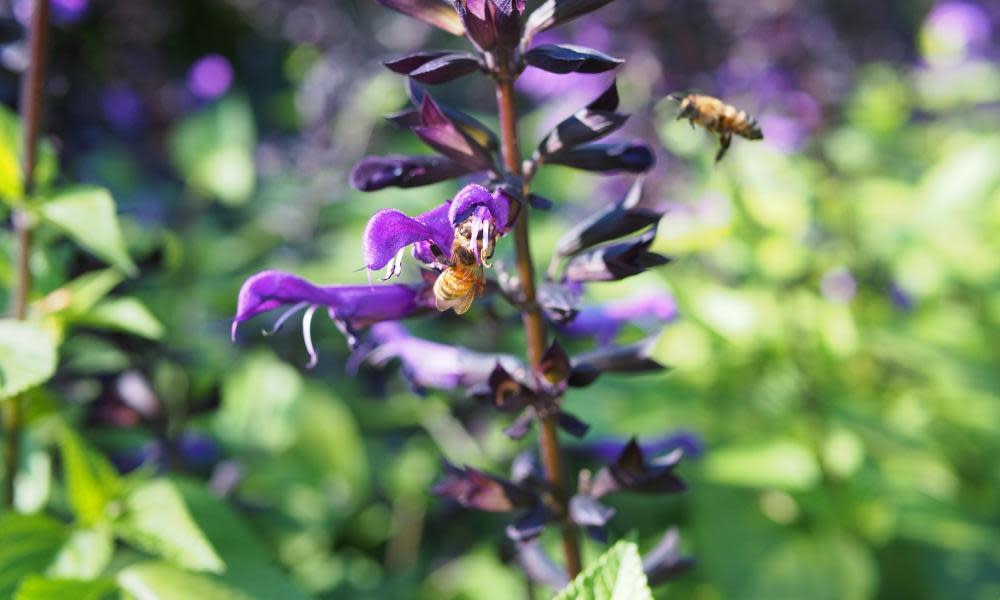Poem of the week: The Garden by Nicholas Grimald

The Garden
The issue of great Jove, draw near, you Muses nine!
Help us to praise the blissful plot of garden ground so fine.
The garden gives good food and aid for leech’s cure;
The garden, full of great delight, his master doth allure.
Sweet sallet herbs be here, and herbs of every kind;
The ruddy grapes, the seemly fruits, be here at hand to find.
Here pleasance wanteth not to make a man full fain;
Here marvellous the mixture is of solace and of gain.
To water sundry seeds, the furrow by the way
A running river, trilling down with liquor, can convey.
Behold, with lively hue fair flow’rs that shine so bright;
With riches, like the orient gems, they paint the mould in sight.
Bees, humming with soft sound (their murmur is so small),
Of blooms and blossoms suck the tops; on dewed leaves they fall.
The creeping vine holds down her own bewedded elms,
And, wandering out with branches thick, reeds folded overwhelms.
Trees spread their coverts wide with shadows fresh and gay;
Full well their branched bows defend the fervent sun away.
Birds chatter, and some chirp, and some sweet tunes do yield;
All mirthful, with their songs so blithe, they make both air and field.
The garden it allures, it feeds, it glads the sprite;
From heavy hearts all doleful dumps the garden chaseth quite.
Strength it restores to limbs, draws and fulfils the sight;
with cheer revives the senses all and maketh labour light.
O, what delights to us the garden ground doth bring!
Seed, leaf, flow’r, fruit, herb, bee, and tree, and more than I may sing!
The Garden was first published among the “Songes and Sonnettes” of Tottel’s Miscellany in 1557. Nicholas Grimald contributed a substantial number of poems to the anthology, and is thought likely to have been one of its editors. More of his work, as well as The Garden, can be read in the reprinted edition here.
Grimald – Protestant preacher, scholar, playwright and poet – was born in Huntingdonshire in 1519. He was appointed chaplain to Nicholas Ridley, Bishop of London, in 1552. During the reign of the Catholic Queen Mary, Ridley was executed, and Grimald imprisoned. He recanted and was released, but is said to have reverted later to Protestantism. Little is known about the circumstances of his death, circa 1562.
This week’s poem reflects almost none of the turmoil of those years. It preaches the gentlest of sermons, suggesting that what the garden offers contrasts therapeutically with the kinds of pleasure that leave a man “full fain”, ie subject to compulsion. “Here marvellous the mixture is of solace and of gain”. It’s not a profound meditation on gardens, and cannot compete technically with the elegance of Marvell’s poem of the same name, for which it’s likely to have been one of the English models. As a tripping, occasionally tripping-over, pastoral dance, it’s still an engaging introduction to Grimald’s shorter poems.
His choice of classical metres here is characteristic. The first line of each couplet is iambic hexameter (six beats, 12 syllables), and it’s necessary to imagine a small pause, even where no comma is indicated, between the first set of three beats and the second, to ensure the rhythmic flow. The second line of each couplet is iambic heptameter – seven beats and 14 syllables. This is how I scan the invocation of the first two lines, a pattern that seems to work throughout the poem.
“The issue of great Jove, / draw near, you Muses nine!
Help us to praise the blissful plot of garden ground so fine.”
There are moments when the attention of Grimald’s Muses seems casually general, and others where you feel they’re getting down to serious business. The details about the bees, murmuring softly and falling drunkenly on to the flowers’ “dewed leaves” is delightful. And the subsequent observation of the “creeping vine” introduces a visually effective, predatory metaphor into the idyll, the “bewedded elms” being lovingly strangled by this ambitious plant (which sounds more like ivy than a grape-vine). Perhaps the hint of a political analogy has invaded the garden after all.
Bees, humming with soft sound (their murmur is so small),
Of blooms and blossoms suck the tops; on dewed leaves they fall.
The creeping vine holds down her own bewedded elms,
And, wandering out with branches thick, reeds folded overwhelms.
A cure for all kinds of ills, including melancholy’s “doleful dumps”, the garden’s bounty expands magnificently in the final couplet. The monosyllabic list of the last line is a perfect fit with the meter, although it looks cluttered, and enunciation may require practice.
O, what delights to us the garden ground doth bring!
Seed, leaf, flow’r, fruit, herb, bee, and tree, and more than I may sing!
If you can immediately recite “Seed, leaf” as an iamb, you’re a better reciter than I amb.

 Yahoo Movies
Yahoo Movies 
